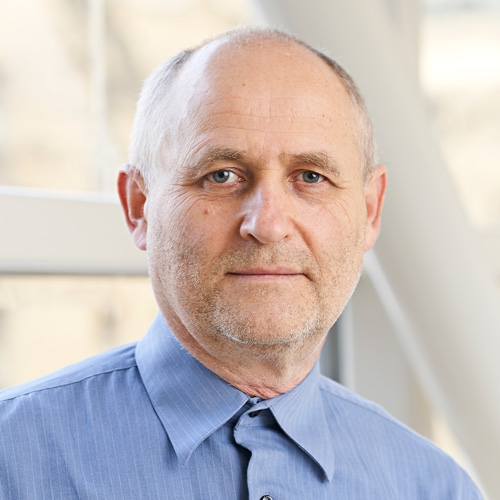Specializing In:
- Molecular biology of cancer
- Immunodiagnostics of cancer
- Identifying targets for cancer immunotherapy
Research Interests:
- Cancer immunotherapy
- Anticancer vaccine
- Pharmacological enhancement of immunogenicity
Biography
Dr. Ionov joined the staff of Roswell Park Comprehensive Cancer Center as an Affiliate Member in the Department of Cancer Genetics in 2001 and was appointed Assistant Member in 2004. Dr. Ionov earned his doctoral degree in molecular biology at All-Union Research Institute of Genetics and Selection of Industrial Microorganisms. He continued his postdoctoral training in Cancer Genetics at the California Institute of Biological Research and in the Burnham Institute in San Diego, California. He then took the position of Instructor at the University of Colorado Health Science Center. Dr. Ionov joined the staff of Roswell Park Comprehensive Cancer Center as an Affiliate Member in the Department of Cancer Genetics in 2001 and was appointed Assistant Member in 2004.
Positions
Roswell Park Comprehensive Cancer Center
- Assistant Professor of Oncology
- Department of Cancer Genetics and Genomics
State University of New York at Buffalo
- Assistant Professor
Background
Education and Training
- Moscow Institute of Physics & Technology, Moscow
- Research Institute of Genetics, Moscow
Research Overview
The focus of our lab is to develop a novel type of anti-cancer immunotherapy which is based on a novel type of immunotherapeutic targets. Our approach is based on the following fundamental principles: 1) cells experiencing DNA damage repress transcription of many cell cycle-related genes; 2) cancer cells with a mutated p53 gene are unable to mediate this transcriptional repression, creating a clear transcriptional difference between normal and cancer cells within a cancer patient; 3) certain chemotherapies (e.g., topotecan, 5-fluorouracil, etc.), in addition to causing DNA damage also damage RNA, including small nuclear RNAs of spliceosomes, thus causing inhibition of splicing. Translation of abnormally spliced mRNA products in cancer cells from genes that in response to chemotherapy are transcriptionally repressed in normal calls (with functional p53 gene) results in the production specifically in cancer cells of proteins containing novel peptide sequences. These sequences may contain neo-epitopes recognized by T-cells of cancer patients and elicit strong immune responses. These chemotherapy-induced neo-epitopes which we call chemo-neoepitopes (CNE) are not unique to a cancer patient but reproducibly generated and shared between many cancer patients. The immune response generated against CNEs can be much stronger than that against mutational neo-antigens continuously expressed by tumor cells because prolonged coevolution of a tumor and the immune system frequently results in immune tolerance during the immunoediting process. Potentially, the immune response induced by vaccination against CNEs can be as strong as that against viral or bacterial proteins because the chemotherapy-generated targets have never been expressed by the cancer cells or normal cells before chemotherapy is started.
We work on providing evidence that the strong immune response induced by prior vaccination of cancer patients with peptides corresponding to chemo-neo-epitopes generated during chemotherapy by aberrant splicing will result in the efficient elimination of cancer cells. The effect of simultaneous action of both immuno- and chemotherapy can be much stronger than the effect from each treatment alone. We use a mouse model of breast cancer to demonstrate the efficiency of this novel type of combining of chemo- and immunotherapy to treat metastatic breast cancer.
Publications
Comparison of motif-based and whole-unique-sequence-based analyses of phage display library datasets generated by biopanning of anti-Borrelia burgdorferi immune sera.
Ionov Y, Rogovskyy AS.PLoS One. 2020
Identification of cancer-specific motifs in mimotope profiles of serum antibody repertoire.
Gerasimov E, Zelikovsky A, Măndoiu I, Ionov Y. BMC Bioinformatics. 2017
Serum Antibody Repertoire Profiling Using In Silico Antigen Screen.
Liu X, Hu Q, Liu S, Tallo LJ, Sadzewicz L, Schettine CA, Nikiforov M, Klyushnenkova EN, Ionov Y. PLoS One. 2013
A high throughput method for identifying personalized tumor-associated antigens.
Ionov Y. Oncotarget. 2010
Ubiquitous somatic mutations in simple repeated sequences reveal a new mechanism for colonic carcinogenesis.
Ionov Y, Peinado MA, Malkhosyan S, Shibata D, Perucho M.Nature. 1993
